Reuters
Thu, November 2, 2023
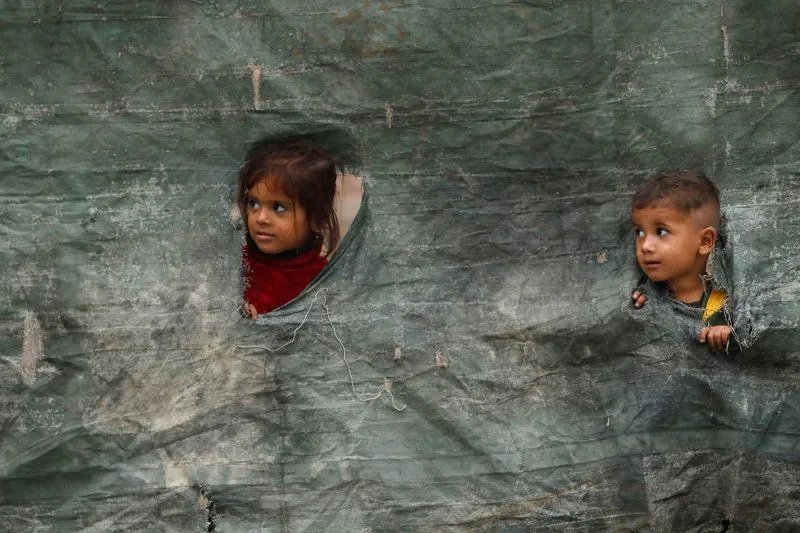
Pakistan gives last warning to undocumented immigrants to leave, in Nowshera
KARACHI, Pakistan (Reuters) - Pakistan's midnight deadline for undocumented foreigners to leave expired on Thursday, as more than 140,000 migrants, mostly Afghans, were estimated to have left voluntarily.
Authorities rounded up people to temporary holding centres a day earlier, ahead of Wednesday's deadline, set a month ago, to leave or face expulsion. Some who have spent decades in Pakistan crammed into trucks queued on the border.
WHY IS PAKISTAN DEPORTING FOREIGNERS?
The sudden expulsion threat came after suicide bombings this year that the government said involved Afghans, though without providing evidence.
Pakistani authorities said Afghan nationals were found to be involved in attacks against the government and the army, including 14 of this year's 24 suicide bombings.
Islamabad has also blamed them for smuggling and other militant attacks as well as petty crimes. Kabul rejects the accusations.
Pakistan has brushed off calls to reconsider its decision from the United Nations, rights groups and Western embassies, who have urged it to incorporate into its plan a way to identify and protect Afghans facing the risk of persecution at home.
HOW MANY FOREIGNERS ARE THERE?
The vast majority of undocumented foreigners in Pakistan are Afghans, and, while authorities have not yet provided official data, only a few would comprise people from Iran and some central Asian countries, among others.
Pakistan is home to more than 4 million Afghan migrants and refugees, about 1.7 million of them undocumented, Islamabad says, although many have lived in Pakistan for their entire lives.
About 600,000 Afghans have crossed into neighbouring Pakistan since the Taliban took over in 2021, joining a large number there since the Soviet invasion of Afghanistan in 1979 and the ensuing civil wars.
Islamabad says deportation will be orderly, carried out in phases and start with those who have criminal records. Authorities have threatened raids in areas suspected of housing "undocumented foreigners" after Wednesday.
WHAT IS AFGHANISTAN SAYING ABOUT THE DEPORTATION?
Afghanistan's Taliban-run administration has dismissed Pakistan's accusations against Afghan migrants.
It has asked all countries hosting Afghan refugees to give them more time to prepare for repatriation.
"We call on them not to deport forcefully Afghans without preparation, rather give them enough time and countries should use tolerance," the administration said in a social media post on Afghans in Pakistan and elsewhere.
It assured Afghans who have left over political concerns that they could return and live peacefully in the country.
(Reporting by Ariba Shahid in Karachi; Writing by Shivam Patel; Editing by Clarence Fernandez)
Border crossing with Afghanistan swamped by Afghans after Pakistani expulsion order
Mushtaq Ali
Updated Thu, November 2, 2023
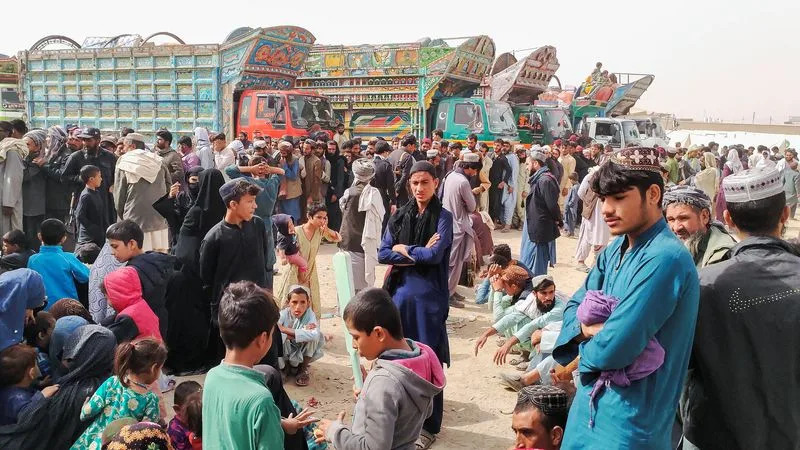
Pakistan gives last warning to undocumented immigrants to leave, in Chaman
By Mushtaq Ali
PESHAWAR, Pakistan (Reuters) -Thousands of people swamped Pakistan's main northwestern border crossing seeking to cross into Afghanistan on Thursday, a day after the government's deadline expired for undocumented foreigners to leave or face expulsion.
Pakistani authorities began rounding up undocumented foreigners, most of them Afghans, hours before Wednesday's deadline. More than a million Afghans could have to leave or face arrest and forcible expulsion as a result of the ultimatum delivered by the Pakistan government a month ago.
Scrambling to cope with the sudden influx, the Taliban-run administration in Afghanistan said temporary transit camps had been set up, and food and medical assistance would be provided, but relief agencies reported dire conditions across the border.
"The organisations' teams stationed in the areas where people are returning from Pakistan have reported chaotic and desperate scenes among those who have returned," the Norwegian Refugee Council, Danish Refugee Council and International Rescue Committee said in a joint statement.
The Pakistani government has brushed off calls from the United Nations, rights groups and Western embassies to reconsider its expulsion plan, saying Afghans had been involved in Islamist militant attacks and in crime that undermined the security of the country.
BORDER BOTTLENECK
More than 24,000 Afghans crossed the northwestern Torkham crossing into Afghanistan on Wednesday alone, Deputy Commissioner Khyber Tribal District Abdul Nasir Khan said. "There were a large number waiting for clearance and we made extra arrangements to better facilitate the clearance process."
Authorities had worked well into the night at a camp set up near the crossing, he added. The border, at the northwestern end of the Khyber Pass on the road between Peshawar in Pakistan and Jalalabad in Afghanistan, is usually closed by sundown.
Khan said 128,000 Afghans had left through the crossing since the Pakistani government issued its directive.
Others were crossing the border at Chaman, in Pakistan's southwestern province of Balochistan.
Major roads leading to border crossings were jammed with trucks carrying families and whatever belongings they could carry.
Aid agencies estimated the number of arrivals at Torkham had risen from 300 people a day to 9,000-10,000 since last month's expulsion decree.
Some Afghans who have been ordered to leave have spent decades in Pakistan, while some have never even been to Afghanistan, and wonder how they can start a new life there.
Of the more than 4 million Afghans living in Pakistan, the government estimates 1.7 million are undocumented.
Many fled during the decades of armed conflict that Afghanistan suffered since the late 1970s, while the Islamist Taliban's takeover after the withdrawal of U.S.-led coalition forces in 2021 led to another exodus.
Aid agencies warned that the mass movement of people could tip Afghanistan into yet another crisis and expressed "grave concerns" about the survival and reintegration of the returnees, particularly with the onset of winter.
International humanitarian funding for Afghanistan dried up after the Taliban took over and imposed restrictions on women.
SHORTAGE OF TRANSPORT
Over 1,500 undocumented Afghans were being brought to the southwestern Chaman crossing after being rounded up in police raids in different areas of Pakistan, including the major port Karachi, Balochistan Information Minister Jan Achakzai said.
People crossing from Chaman into Afghanistan's Spin Boldak have run into trouble finding transport to their final destinations, said Ismatullah, a bus service operator.
"A huge number of people are coming from Karachi but face a shortage of buses and trucks," he told Reuters by phone from Spin Boldak. "Obviously in such situations the fares have increased. The (Afghan) government is helping people according to its ability, but it is not enough."
(Reporting by Mushtaq Ali in Peshawar, Gibran Peshimam in Islamabad, Saleem Ahmed in Quetta and Mohammad Yunus Yawar in Kabul; Writing by Asif Shahzad and Gibran Peshimam; Editing by Simon Cameron-Moore)
Aid agencies warn of chaotic and desperate scenes among Afghans returning from Pakistan
Associated Press
Updated Thu, November 2, 2023
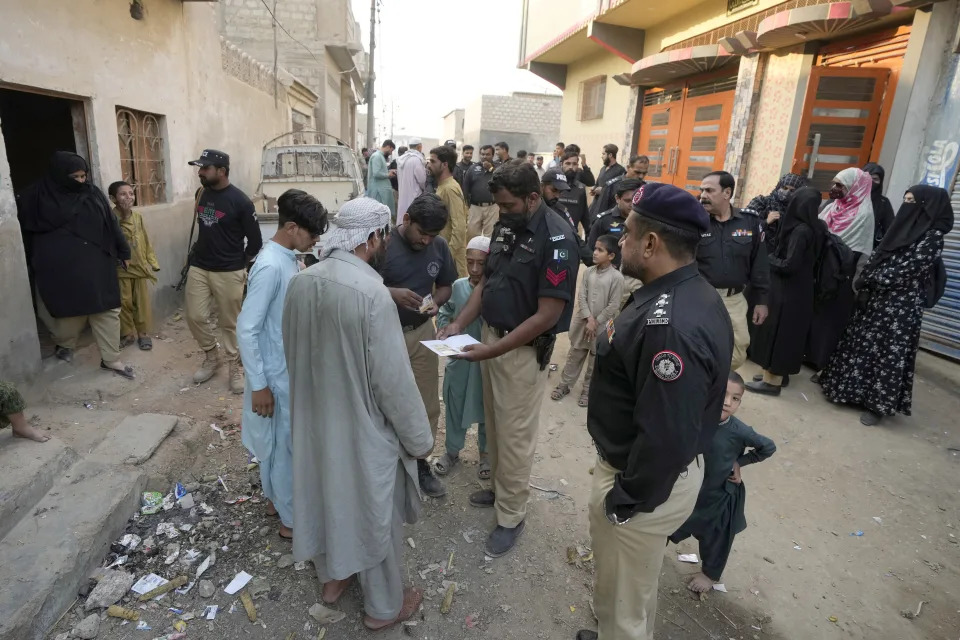

1 / 14
A Police officer checks documents of a resident during a search operation against illegal immigrants, at a neighborhood of Karachi, Pakistan, Thursday, Nov. 2, 2023. Pakistani security forces have rounded up, detained and deported dozens of Afghans who were living in the country illegally, after a government-set deadline for them to leave expired, authorities said.
(AP Photo/Fareed Khan)
ISLAMABAD (AP) — Major international aid agencies on Thursday warned of chaotic and desperate scenes among Afghans who have returned from Pakistan, where security forces are detaining and deporting undocumented or unregistered foreigners.
The crackdown on illegal migration mostly affects Afghans because they are the majority of foreigners living in Pakistan, although the government says it is targeting all who are in the country illegally.
Three aid organizations — the Norwegian Refugee Council, Danish Refugee Council and the International Rescue Committee — said many people fleeing the Pakistani crackdown arrived in Afghanistan in poor condition.
“The conditions in which they arrive in Afghanistan are dire, with many having endured arduous journeys spanning several days, exposed to the elements, and often forced to part with their possessions in exchange for transportation,” the agencies said in a statement.
Between 9,000 and 10,000 Afghans are now crossing the border every day from Pakistan. Previously it was around 300 a day, according to agency teams on the ground.
Returning Afghans have nowhere to go and the agencies said they fear for people's survival and reintegration in a country overwhelmed by natural disasters, decades of war, a struggling economy, millions of internally displaced people and a humanitarian crisis.
Salma Ben Aissa, the International Rescue Committee's country director in Afghanistan, said returnees face a bleak future, especially if they lived in Pakistan for decades.
Afghanistan's Taliban authorities say they have prepared temporary camps for Afghans in border areas, providing people with food, shelter, health care and SIM cards.
On Thursday, Pakistan's Interior Minister Sarfraz Bugti said he assured the Taliban's top diplomat in the country, Ahmad Shakib, that Afghan women and children will be exempt from biometric tests like fingerprinting to facilitate their return.
Bugti told Shakib that Afghans will be treated with the utmost respect and dignity, according to a ministry statement. No action is being taken against those who have been registered as living in Pakistan or have an Afghan citizen card, he added.
Pakistani police are carrying out raids across the country to check foreigners' documents.
Authorities demolished mud-brick homes on the outskirts of the capital of Islamabad earlier this week to force Afghans to leave the area. Household items were buried under rubble after heavy machinery pulled down the makeshift dwellings.
Pakistan has hosted millions of Afghans over the decades, including those who fled their country during the 1979-1989 Soviet occupation.
Thousands of Afghans forced to return as Pakistan’s anti-migrant deadline ends
ISLAMABAD (AP) — Major international aid agencies on Thursday warned of chaotic and desperate scenes among Afghans who have returned from Pakistan, where security forces are detaining and deporting undocumented or unregistered foreigners.
The crackdown on illegal migration mostly affects Afghans because they are the majority of foreigners living in Pakistan, although the government says it is targeting all who are in the country illegally.
Three aid organizations — the Norwegian Refugee Council, Danish Refugee Council and the International Rescue Committee — said many people fleeing the Pakistani crackdown arrived in Afghanistan in poor condition.
“The conditions in which they arrive in Afghanistan are dire, with many having endured arduous journeys spanning several days, exposed to the elements, and often forced to part with their possessions in exchange for transportation,” the agencies said in a statement.
Between 9,000 and 10,000 Afghans are now crossing the border every day from Pakistan. Previously it was around 300 a day, according to agency teams on the ground.
Returning Afghans have nowhere to go and the agencies said they fear for people's survival and reintegration in a country overwhelmed by natural disasters, decades of war, a struggling economy, millions of internally displaced people and a humanitarian crisis.
Salma Ben Aissa, the International Rescue Committee's country director in Afghanistan, said returnees face a bleak future, especially if they lived in Pakistan for decades.
Afghanistan's Taliban authorities say they have prepared temporary camps for Afghans in border areas, providing people with food, shelter, health care and SIM cards.
On Thursday, Pakistan's Interior Minister Sarfraz Bugti said he assured the Taliban's top diplomat in the country, Ahmad Shakib, that Afghan women and children will be exempt from biometric tests like fingerprinting to facilitate their return.
Bugti told Shakib that Afghans will be treated with the utmost respect and dignity, according to a ministry statement. No action is being taken against those who have been registered as living in Pakistan or have an Afghan citizen card, he added.
Pakistani police are carrying out raids across the country to check foreigners' documents.
Authorities demolished mud-brick homes on the outskirts of the capital of Islamabad earlier this week to force Afghans to leave the area. Household items were buried under rubble after heavy machinery pulled down the makeshift dwellings.
Pakistan has hosted millions of Afghans over the decades, including those who fled their country during the 1979-1989 Soviet occupation.
Thousands of Afghans forced to return as Pakistan’s anti-migrant deadline ends
Arpan Rai
Wed, November 1, 2023
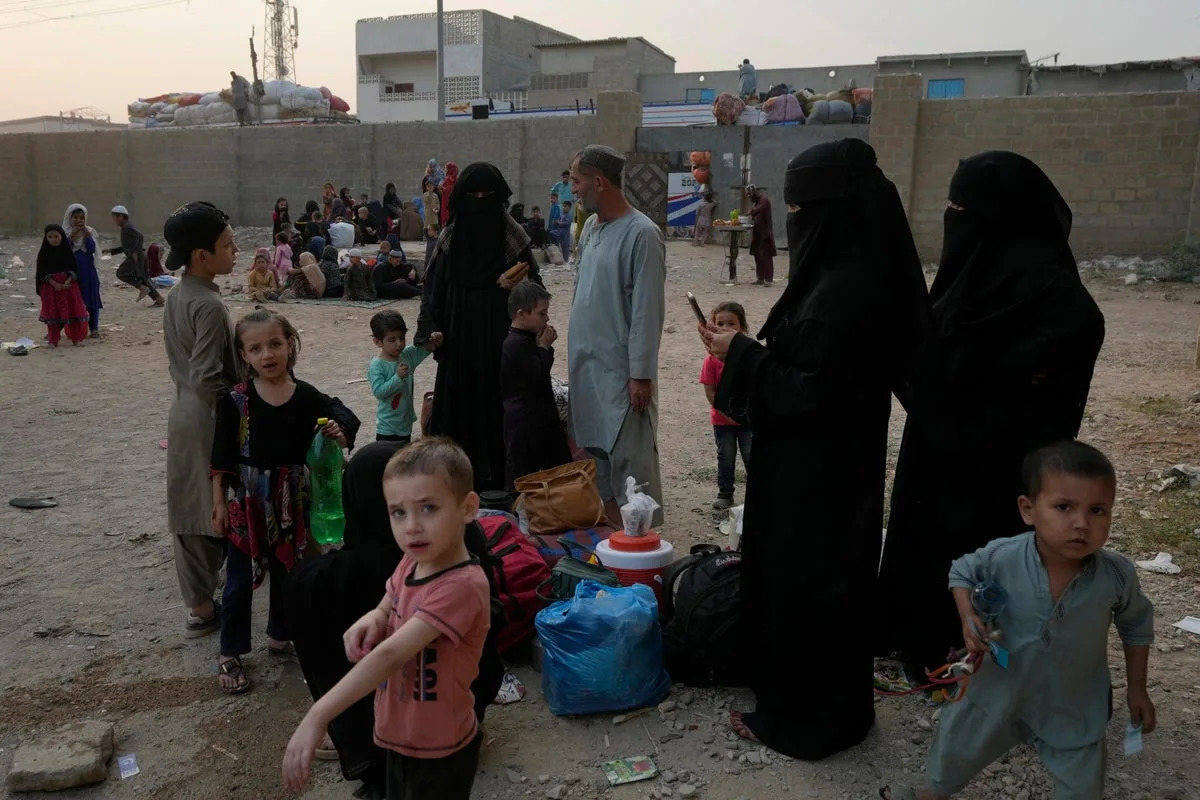
Afghan families wait in Karachi, Pakistan for transport to take them to their homeland (Associated Press)
More than 100,000 undocumented Afghan nationals have left Pakistan and returned to Afghanistan through the northwestern Torkham border crossing as the deadline for anti-migrant crackdown looms.
These hundreds of thousands Afghan nationals travelled from across Pakistan cities to reach the border crossing, deputy commissioner Abdul Nasir Khan said on Wednesday.
The deadline imposed by Pakistan for deportation or forced removal of all undocumented immigrants, including Afghan nationals who had fled the Taliban, expired on Tuesday night.
On Wednesday, dozens of Afghans were rounded up, detained and deported after they were found to be allegedly living in Pakistan, authorities said.
“Today, we said goodbye to 64 Afghan nationals as they began their journey back home,” Pakistani interim interior minister Sarfraz Bugti said.
“This action is a testament to Pakistan’s determination to repatriate any individuals residing in the country without proper documentation.”
The crackdown took place in Pakistan’s port city of Karachi, the garrison city of Rawalpindi, and in various areas in the southwestern Baluchistan and northwestern Khyber Pakhtunkhwa provinces, which border Afghanistan, officials said.
This week saw undocumented Afghans in Pakistan rushing to the country’s border with Afghanistan.
Thousands of Afghan nationals had escaped to Pakistan in the months following the Taliban’s takeover of the country in August 2021. The Afghans had left their home country to escape the militant group’s wrath.
More than two million undocumented Afghans currently live in Pakistan, of which 600,000 had fled after the Taliban’s takeover, according to UN agencies.
Scores of the undocumented immigrants are now staring at the deadline set by the Pakistani government underits new anti-migrant crackdown.
Officials in Islamabad have said undocumented Afghans living in the country will face arrest and deportation after Wednesday.
The crackdown has left the Torkam and Chaman border crossings, in the north and west sides respectively of the countries’ shared border, open beyond their daily 4pm deadline hour to permit those who wish to leave from these points.
Pakistani officials said more than 200,000 Afghans have left the country since the crackdown was launched. The sharp surge was also confirmed by UN agencies.
The deportations will be carried out in a “phased and orderly” manner, Pakistan has claimed.
The move impacts thousands of Afghans waiting in Pakistan for international agencies to clear their asylum applications. Thousands who fled the country after August 2021 are also waiting for relocation to the US under a special refugee programme.
The rules for the US application required them to relocate to a third country to process their cases.
Several embassies of Nato members in Islamabad, along with the UN’s refugee agency, are lobbying with officials in the Pakistan government at the highest levels to seek exemption from deportation for the thousands of Afghans waiting to be resettled to Western countries.
A US diplomat, who spoke on the condition of anonymity, explained Washington’s priority was to facilitate the safe and efficient resettlement and relocation of more than 25,000 eligible Afghans in Pakistan.
“We are in the process of sending letters to those individuals that they can share with local authorities to help identify them as individuals in the US pipeline,” the diplomat said.
Pakistan’s crackdown has drawn widespread criticism from UN agencies, rights groups and the Taliban-led administration in Afghanistan.
Officials in the Western embassies and the UN have asked Pakistan for a way to identify and protect thousands of undocumented migrants to prevent them from persecution at the hands of the Taliban.
“We are asking the government to come up with a comprehensive system and... mechanism to manage and register people at immediate risk of persecution if forced to return,” said Qaiser Khan Afridi, the spokesman for the UN refugee agency in Pakistan.
“Because they cannot return, they can’t go back to Afghanistan because their freedom or their life might be at risk.”
It is not immediately clear if Pakistan has agreed to take up the proposals by the UN and other embassies.
The campaign by Pakistan comes amid strained relations between it and the Taliban rulers next door.
Islamabad accuses Kabul of turning a blind eye to Taliban-allied militants who find shelter in Afghanistan from where they go back and forth across the two countries’ shared 2,611km-long border to stage attacks in Pakistan.
The Taliban deny the accusations.
Afghanistan is also one of the most economically poor countries in the world.
It has reeled under successive severe humanitarian crises, particularly for women and girls who are banned by the Taliban from getting an education beyond the sixth grade, and from most public spaces and jobs.
There are also restrictions on media, activists, and civil society organisations.
The country under Taliban’s rule has been hit by drought and earthquakes, with millions fearing the forthcoming winter season.
Afghan refugees fear as Pakistan prepares for deportations
Azizullah Khan & Kelly Ng - in Peshawar and Singapore
BBC
Wed, November 1, 2023
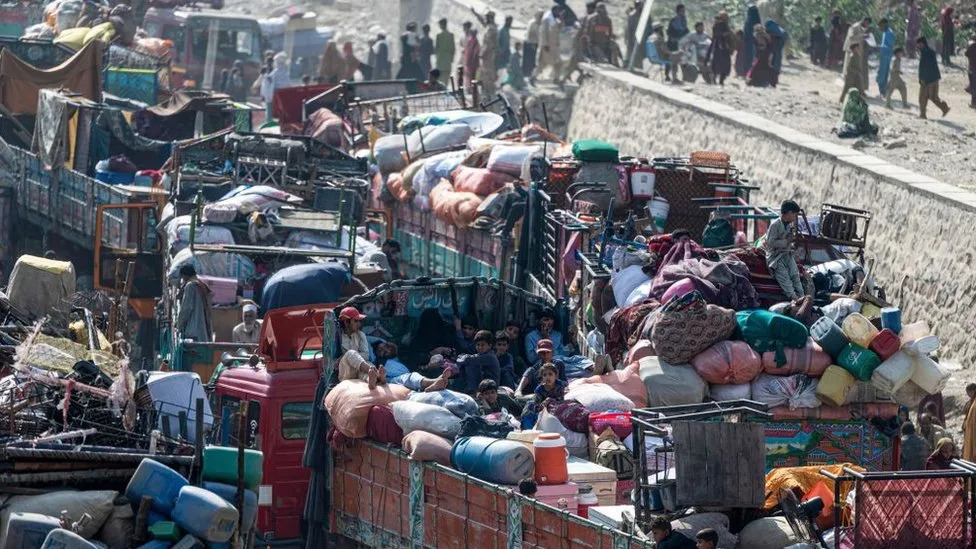
Refugees arrive in trucks at the Pakistan-Afghanistan border
Thousands of Afghans living in Pakistan have raced to the border to beat a Wednesday deadline for undocumented foreigners to leave the country.
Pakistan says 1.7 million such people must leave by 1 November or face arrest and deportation. Most are Afghans.
Many refugees are terrified, having fled Afghanistan after the Taliban retook control in 2021. Others have been in Pakistan for decades.
The deadline to leave technically expired at midnight on Tuesday.
However Pakistani media report that those who are in transit to leave the country will be allowed to continue their journeys throughout the day.
"Where will we go if we are forced to leave Pakistan?" asked one young woman.
Sadia, who has been studying in Peshawar in north-west Pakistan, said she escaped Afghanistan two years ago for a chance at getting an education, after the Taliban government barred girls and women from school under its harsh version of Islamic law.
"I am studying here in Pakistan and I wish to continue my education here. If we are forced to leave, I will not be able to continue my study in Afghanistan. My parents, my sister and brother are scared about the future," she told BBC Urdu.
Tensions between the countries soared after a spike in cross-border attacks, which Islamabad blames on Afghanistan-based militants.
Afghanistan's Taliban government, who deny providing sanctuary for militants targeting Pakistan, have called the move to deport undocumented Afghans "unacceptable".
Throngs of refugees rushed to the border with Afghanistan on Tuesday - the last day for them to leave or be deported - on trucks overflowing with clothes and furniture.
Close to 200,000 Afghans have returned home as of Monday, Pakistan said. Reports said 20,000 journeyed to the border on Tuesday as time to leave ran out.
Eight in 10 who left said they feared being arrested if they stayed, according to a UN report.
Many of these refugees, who fled Afghanistan after the Taliban retook control of the government, fear that their dreams and livelihoods will be crushed - yet again.
But Pakistan, which has been wrestling with an economic crisis in recent years, is short of patience. In July, the Pakistani rupee saw its sharpest drop against the dollar since October 1998.
Afghans in UK visa limbo as Pakistan vows to expel migrants
What rise of Taliban means for Pakistan
Key moments in the crushing of Afghan women's rights
The UN's human rights office urged Pakistani authorities to stop deportations to avoid a "human rights catastrophe".
"We believe many of those facing deportation will be at grave risk of human rights violations if returned to Afghanistan, including arbitrary arrest and detention, torture, cruel and other inhuman treatment," said Ravina Shamdasani, spokeswoman of the UN's human rights office.
The Taliban government have all but broken their earlier promises to give women the right to work and study - the suppression of women's rights under their rule is the harshest in the world,
Girls in Afghanistan are only allowed to attend primary school. They are not allowed in parks, gyms and pools. Beauty salons have been shut and women are required to be dressed in head-to-toe clothing.
Wed, November 1, 2023

Refugees arrive in trucks at the Pakistan-Afghanistan border
Thousands of Afghans living in Pakistan have raced to the border to beat a Wednesday deadline for undocumented foreigners to leave the country.
Pakistan says 1.7 million such people must leave by 1 November or face arrest and deportation. Most are Afghans.
Many refugees are terrified, having fled Afghanistan after the Taliban retook control in 2021. Others have been in Pakistan for decades.
The deadline to leave technically expired at midnight on Tuesday.
However Pakistani media report that those who are in transit to leave the country will be allowed to continue their journeys throughout the day.
"Where will we go if we are forced to leave Pakistan?" asked one young woman.
Sadia, who has been studying in Peshawar in north-west Pakistan, said she escaped Afghanistan two years ago for a chance at getting an education, after the Taliban government barred girls and women from school under its harsh version of Islamic law.
"I am studying here in Pakistan and I wish to continue my education here. If we are forced to leave, I will not be able to continue my study in Afghanistan. My parents, my sister and brother are scared about the future," she told BBC Urdu.
Tensions between the countries soared after a spike in cross-border attacks, which Islamabad blames on Afghanistan-based militants.
Afghanistan's Taliban government, who deny providing sanctuary for militants targeting Pakistan, have called the move to deport undocumented Afghans "unacceptable".
Throngs of refugees rushed to the border with Afghanistan on Tuesday - the last day for them to leave or be deported - on trucks overflowing with clothes and furniture.
Close to 200,000 Afghans have returned home as of Monday, Pakistan said. Reports said 20,000 journeyed to the border on Tuesday as time to leave ran out.
Eight in 10 who left said they feared being arrested if they stayed, according to a UN report.
Many of these refugees, who fled Afghanistan after the Taliban retook control of the government, fear that their dreams and livelihoods will be crushed - yet again.
But Pakistan, which has been wrestling with an economic crisis in recent years, is short of patience. In July, the Pakistani rupee saw its sharpest drop against the dollar since October 1998.
Afghans in UK visa limbo as Pakistan vows to expel migrants
What rise of Taliban means for Pakistan
Key moments in the crushing of Afghan women's rights
The UN's human rights office urged Pakistani authorities to stop deportations to avoid a "human rights catastrophe".
"We believe many of those facing deportation will be at grave risk of human rights violations if returned to Afghanistan, including arbitrary arrest and detention, torture, cruel and other inhuman treatment," said Ravina Shamdasani, spokeswoman of the UN's human rights office.
The Taliban government have all but broken their earlier promises to give women the right to work and study - the suppression of women's rights under their rule is the harshest in the world,
Girls in Afghanistan are only allowed to attend primary school. They are not allowed in parks, gyms and pools. Beauty salons have been shut and women are required to be dressed in head-to-toe clothing.
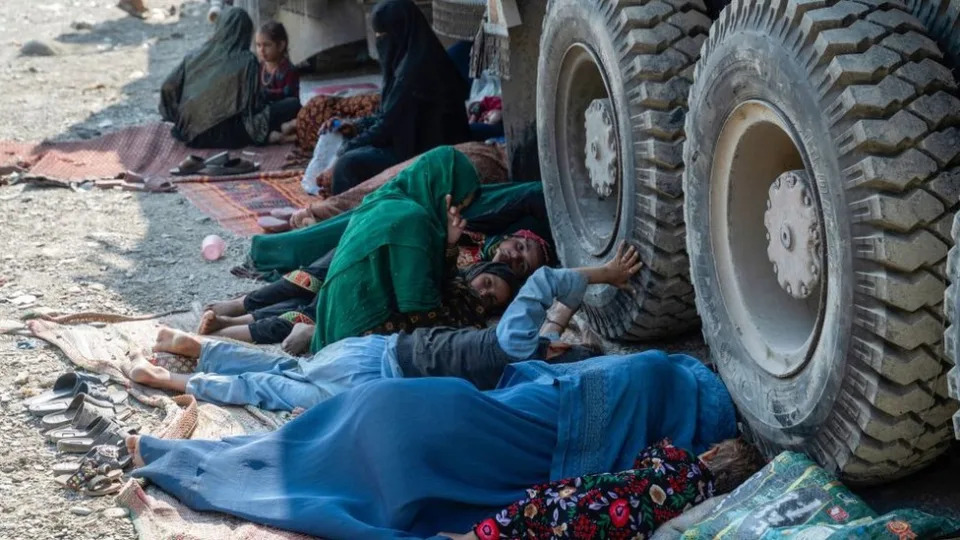
Pakistan said unauthorised refugees will be deported if they do not leave the country before 1 Nov
Earlier this year, the Taliban government also burned musical instruments, claiming music "causes moral corruption".
Afghan singer Sohail said he fled the Afghan capital Kabul "with only some clothes" the night the Taliban seized control of the city in August 2021.
"I cannot live as a musician in Afghanistan," said Mr Sohail, whose family of musicians have been trying to make ends meet in Peshawar.
"We are facing a critical time, as we have no other options, the Taliban do not accept music in Afghanistan and we have no other options for livelihoods," he said.
The Taliban government says it has set up a commission to provide basic services, including temporary accommodation and health services, to returning Afghans.
"We assure them that they will return to their country without any worries and adopt a dignified life," Taliban spokesman Zabihullah Mujahid said on X, formerly known as Twitter.
Pakistan has taken in hundreds of thousands of Afghan refugees over decades of war. About 1.3 million Afghans are registered as refugees while another 880,000 have received the legal status to remain, according to the UN.
But another 1.7 million people are in the country "illegally", Pakistan's Interior Minister Sarfraz Bugti said on 3 October, when he announced the expulsion order.
The UN's figures differ - it estimates that there are more than two million undocumented Afghans living in Pakistan, at least 600,000 of whom arrived after the Taliban returned to power.
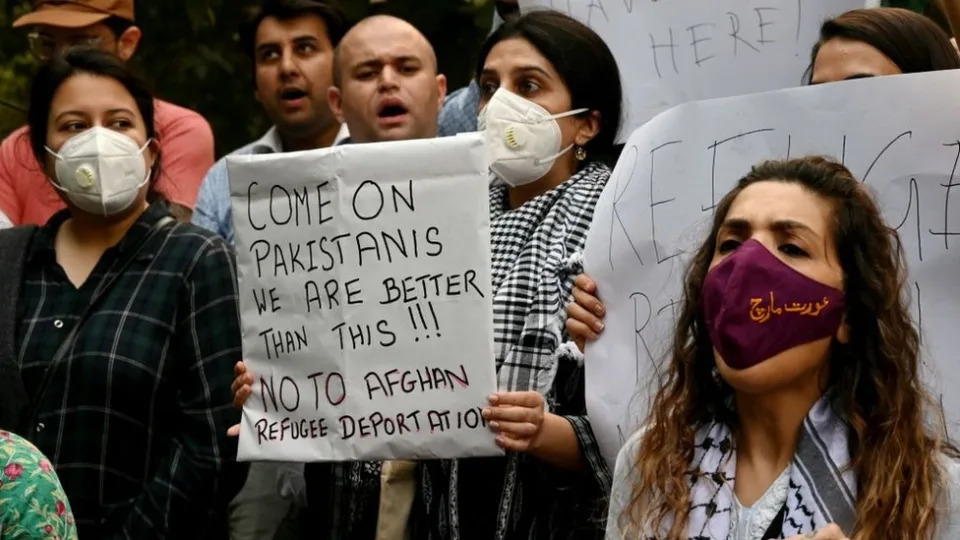
People protest the deportation of Afghans from Pakistan
Mr Bugti's order came after a spike in violence near Pakistan's border with Afghanistan, often involving armed fighters including the Tehrik-e Taliban Pakistan (TTP) - often known as the Pakistani Taliban - and the Islamic State militant group.
The minister claimed "14 out of 24" suicide bombings in Pakistan this year were carried out by Afghan nationals.
"There are no two opinions that we are attacked from within Afghanistan and Afghan nationals are involved in attacks on us... We have evidence," he said according to state media reports.
Unauthorised refugees will be deported if they do not leave, Mr Bugti said on Monday. He stressed the crackdown was not aimed at specific nationalities, but acknowledged that those affected are mainly Afghans.
Earlier in September, Pakistan was hit by two suicide bombings which killed at least 57 people. No group claimed responsibility for the attack, with the TTP denying involvement - though Mr Bugti said one of the suicide bombers had been identified as an Afghan national.
Afghan Refugees in Pakistan Return Home Ahead of Mass Deportation Deadline
Storyful
Tue, October 31, 2023
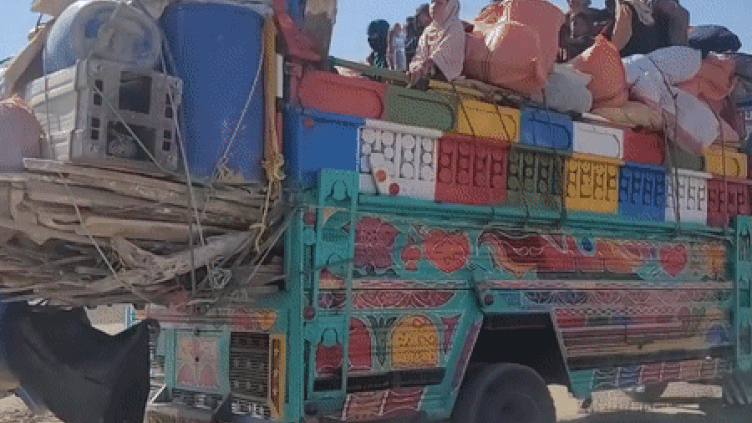
Thousands of Afghans left Pakistan on October 31, ahead of a midnight deadline for undocumented foreigners to leave the country.
More than 1.7 million Afghan refugees who live in Pakistan have been told they must leave by the first of November or they will be arrested and deported, local media reported, citing government officials.
Many fled Afghanistan after the Taliban retook control in 2021, others have been in Pakistan for decades.
This footage published by Radio Free Europe/Radio Liberty (RFE/RL) was taken the day before the deportation deadline and shows refugees returning home across the border.
Afghan refugee Riaz Khan described the reality for himself and other displaced people, according to an RFE/RL translation.
“We don’t have any place to live [in Afghanistan.] We expect a lot of troubles there. You see the whole situation yourself. Many of those going back don’t have houses to live in and they will face problems,” he said.
In Karachi a holding center was set up to process Afghans for deportation.
In the RFE footage an URDU City Commissioner said those who had a residency of up to five years that had expired and those who had overstayed would be bound to go.
The Office of the United Nations High Commissioner for Human Rights (OHCHR) urged authorities to halt deportations due to fears refugees would be at risk of human rights violations including arrest, detention, torture and other inhumane treatment. Credit: Radio Free Europe/Radio Liberty via Storyful
Dozens of Afghans who were illegally in Pakistan are detained and deported in nationwide sweeps
MUNIR AHMED and RIAZ KHAN
Updated Wed, November 1, 2023
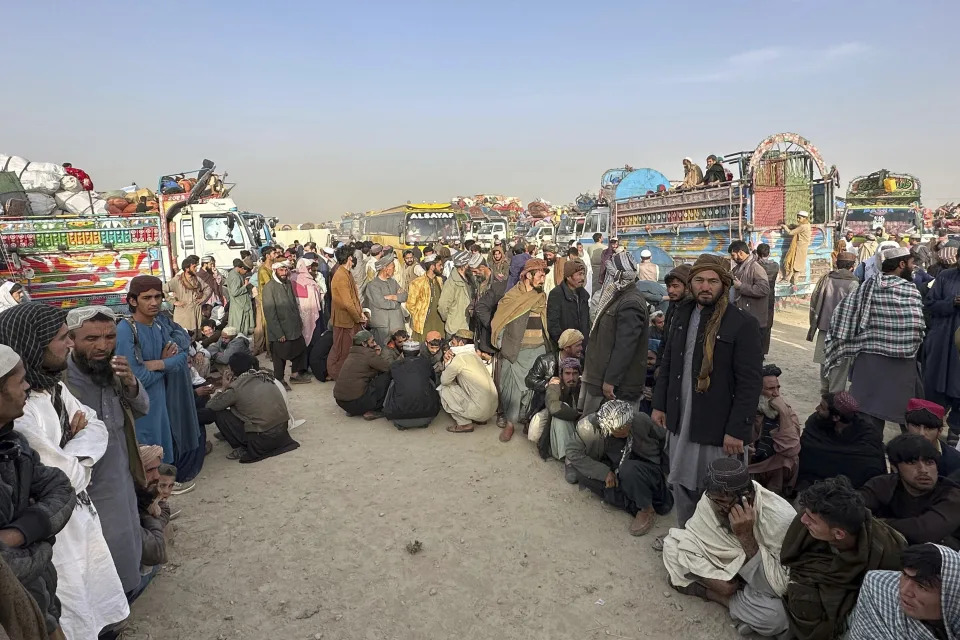
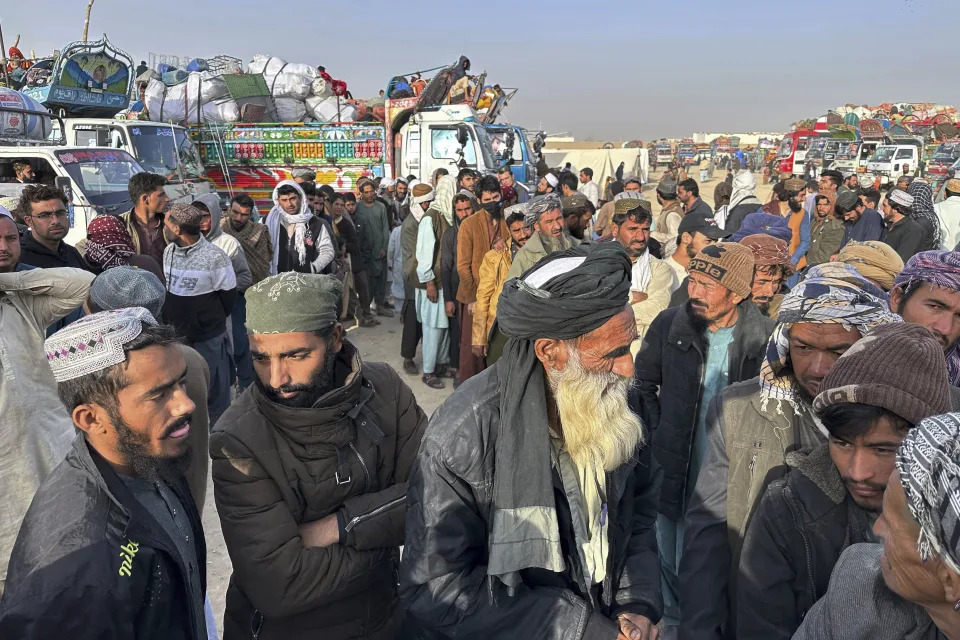
1 / 25
Afghans wait for clearance to depart for their homeland at a deportation camp set up by authorities to facilitate illegal immigrants, in Chaman, a town on the Pakistan-Afghanistan border, Wednesday, Nov. 1, 2023. Pakistani security forces on Wednesday rounded up, detained and deported dozens of Afghans who were living in the country illegally, after a government-set deadline for them to leave expired, authorities said.
(AP Photo/Habibullah Achakzai)
ISLAMABAD (AP) — Pakistani security forces on Wednesday detained and deported dozens of Afghans who were living in the country illegally, after a government-set deadline for them to leave expired, authorities said.
The sweep is part of a new anti-migrant crackdown that targets all undocumented or unregistered foreigners, according to Islamabad, though it mostly affects some 2 million Afghans in Pakistan without documentation.
The crackdown has drawn widespread criticism from U.N. agencies, rights groups and the Taliban-led administration in Afghanistan.
Pakistan’s interim interior minister confirmed that the deportations have begun.
“Today, we said goodbye to 64 Afghan nationals as they began their journey back home,” Sarfraz Bugti wrote on X, formerly known as Twitter. “This action is a testament to Pakistan’s determination to repatriate any individuals residing in the country without proper documentation.”
U.N. Secretary-General Antonio Guterres is “very concerned about this forced movement of people” and would like Pakistan “not to go through with this,” U.N. spokesman Stephane Dujarric said Wednesday.
Sending many Afghans who “are very likely refugees to a country that by most accounts isn’t ready to welcome them back,” and faces a dire humanitarian situation and serious human rights issues, including the Taliban's crackdown on women and girls who are only allowed an elementary education, shouldn't continue, Dujarric said.
The authorities said Wednesday's sweeps took place in the port city of Karachi, the garrison city of Rawalpindi, and in various areas in the southwestern Baluchistan and northwestern Khyber Pakhtunkhwa provinces, which border Afghanistan.
The crackdown has worried thousands of Afghans in Pakistan waiting for relocation to the United States under a special refugee program since fleeing the Taliban takeover. Under U.S. rules, applicants first had to relocate to a third country — in this case Pakistan — for their cases to be processed. Most of those awaiting relocation had worked for the U.S. government, non-government organizations and media organizations in the years before the Taliban returned to power and they fled fearing persecution at home. The Taliban-led administration later announced an amnesty, encouraging Afghans to come back.
On Tuesday, a U.S. official said Washington’s priority was to facilitate the safe and efficient resettlement and relocation of more than 25,000 eligible Afghans in Pakistan to the U.S.
On Wednesday, three Pakistani officials confirmed that Islamabad received the list of such Afghans, but they said the list “was flawed and contained incomplete information." The officials said the list was subsequently withdrawn by the U.S. officials to review and revise it before sending it again after Pakistan sought more clarity.
The officials spoke on condition of anonymity as they were not authorized to speak on the record.
There was no immediate response from the U.S. Embassy about it.
On Tuesday, thousands of Afghans had crammed into trucks and buses and headed to the two key border crossings to return home to avoid arrest and forced deportation.
According to the U.N. agencies, there are more than 2 million undocumented Afghans in Pakistan, at least 600,000 of whom fled after the Taliban takeover in 2021.
Human Right Watch on Tuesday accused Pakistan of resorting to “threats, abuse, and detention to coerce Afghan asylum seekers without legal status” to return to Afghanistan. The New York-based watchdog appealed for authorities to drop the deadline and work with the U.N. refugee agency to register those without papers.
In Afghanistan, Zabihullah Mujahid, the main spokesman for the Taliban government expressed concerns over forced expulsion of Afghans, saying that the past 45 years of wars and conflict in Afghanistan had forced millions to migrate.
The Afghan migrants have not created any problems in their host countries, he added. Without naming Pakistan, he urged host countries “to stop forcefully deporting Afghan refugees" and practice "tolerance based on Islamic and neighborly manners.”
Mujahid said that all Afghans who are in exile “due to political concerns” are welcome back and that the Taliban will provide a “secure environment in Afghanistan” for all.
Late Tuesday, a Taliban delegation traveled from the capital of Kabul to eastern Nangarhar province to find solutions for returning Afghans. Ahmad Banwari, the deputy provincial governor, told local media that the authorities are working hard to establish temporary camps.
Afghan returnees with families that have nowhere to go can stay in the camps for a month until they find a place to live, Banwari said.
Relations between Pakistan and Afghanistan’s Taliban-led administration have become strained over the past two years because of stepped-up attacks by the Pakistani Taliban, a separate militant group that is allied with the Afghan Taliban.
The Pakistani Taliban, known as Tehrik-e-Taliban Pakistan or TTP, have found safe havens in neighboring Afghanistan, from where they sneak across the volatile border to launch deadly attacks on Pakistani forces.
Since the government deadline was announced on October 3, more than 200,000 Afghans have returned home from Pakistan.
Pakistan has said the deportations would be carried out in a “phased and orderly” manner and those detained during the crackdown would be treated nicely. However, authorities on Tuesday demolished several mudbrick homes of Afghans on the outskirts of Islamabad to force them to leave the country.
___
Khan reported from Peshawar, Pakistan. Associated Press writers Rahim Faiez in Islamabad and Abdul Sattar in Quetta, Pakistan, contributed to this report.
Hundreds of thousands of Afghan migrants face deportation from Pakistan
ISLAMABAD (AP) — Pakistani security forces on Wednesday detained and deported dozens of Afghans who were living in the country illegally, after a government-set deadline for them to leave expired, authorities said.
The sweep is part of a new anti-migrant crackdown that targets all undocumented or unregistered foreigners, according to Islamabad, though it mostly affects some 2 million Afghans in Pakistan without documentation.
The crackdown has drawn widespread criticism from U.N. agencies, rights groups and the Taliban-led administration in Afghanistan.
Pakistan’s interim interior minister confirmed that the deportations have begun.
“Today, we said goodbye to 64 Afghan nationals as they began their journey back home,” Sarfraz Bugti wrote on X, formerly known as Twitter. “This action is a testament to Pakistan’s determination to repatriate any individuals residing in the country without proper documentation.”
U.N. Secretary-General Antonio Guterres is “very concerned about this forced movement of people” and would like Pakistan “not to go through with this,” U.N. spokesman Stephane Dujarric said Wednesday.
Sending many Afghans who “are very likely refugees to a country that by most accounts isn’t ready to welcome them back,” and faces a dire humanitarian situation and serious human rights issues, including the Taliban's crackdown on women and girls who are only allowed an elementary education, shouldn't continue, Dujarric said.
The authorities said Wednesday's sweeps took place in the port city of Karachi, the garrison city of Rawalpindi, and in various areas in the southwestern Baluchistan and northwestern Khyber Pakhtunkhwa provinces, which border Afghanistan.
The crackdown has worried thousands of Afghans in Pakistan waiting for relocation to the United States under a special refugee program since fleeing the Taliban takeover. Under U.S. rules, applicants first had to relocate to a third country — in this case Pakistan — for their cases to be processed. Most of those awaiting relocation had worked for the U.S. government, non-government organizations and media organizations in the years before the Taliban returned to power and they fled fearing persecution at home. The Taliban-led administration later announced an amnesty, encouraging Afghans to come back.
On Tuesday, a U.S. official said Washington’s priority was to facilitate the safe and efficient resettlement and relocation of more than 25,000 eligible Afghans in Pakistan to the U.S.
On Wednesday, three Pakistani officials confirmed that Islamabad received the list of such Afghans, but they said the list “was flawed and contained incomplete information." The officials said the list was subsequently withdrawn by the U.S. officials to review and revise it before sending it again after Pakistan sought more clarity.
The officials spoke on condition of anonymity as they were not authorized to speak on the record.
There was no immediate response from the U.S. Embassy about it.
On Tuesday, thousands of Afghans had crammed into trucks and buses and headed to the two key border crossings to return home to avoid arrest and forced deportation.
According to the U.N. agencies, there are more than 2 million undocumented Afghans in Pakistan, at least 600,000 of whom fled after the Taliban takeover in 2021.
Human Right Watch on Tuesday accused Pakistan of resorting to “threats, abuse, and detention to coerce Afghan asylum seekers without legal status” to return to Afghanistan. The New York-based watchdog appealed for authorities to drop the deadline and work with the U.N. refugee agency to register those without papers.
In Afghanistan, Zabihullah Mujahid, the main spokesman for the Taliban government expressed concerns over forced expulsion of Afghans, saying that the past 45 years of wars and conflict in Afghanistan had forced millions to migrate.
The Afghan migrants have not created any problems in their host countries, he added. Without naming Pakistan, he urged host countries “to stop forcefully deporting Afghan refugees" and practice "tolerance based on Islamic and neighborly manners.”
Mujahid said that all Afghans who are in exile “due to political concerns” are welcome back and that the Taliban will provide a “secure environment in Afghanistan” for all.
Late Tuesday, a Taliban delegation traveled from the capital of Kabul to eastern Nangarhar province to find solutions for returning Afghans. Ahmad Banwari, the deputy provincial governor, told local media that the authorities are working hard to establish temporary camps.
Afghan returnees with families that have nowhere to go can stay in the camps for a month until they find a place to live, Banwari said.
Relations between Pakistan and Afghanistan’s Taliban-led administration have become strained over the past two years because of stepped-up attacks by the Pakistani Taliban, a separate militant group that is allied with the Afghan Taliban.
The Pakistani Taliban, known as Tehrik-e-Taliban Pakistan or TTP, have found safe havens in neighboring Afghanistan, from where they sneak across the volatile border to launch deadly attacks on Pakistani forces.
Since the government deadline was announced on October 3, more than 200,000 Afghans have returned home from Pakistan.
Pakistan has said the deportations would be carried out in a “phased and orderly” manner and those detained during the crackdown would be treated nicely. However, authorities on Tuesday demolished several mudbrick homes of Afghans on the outskirts of Islamabad to force them to leave the country.
___
Khan reported from Peshawar, Pakistan. Associated Press writers Rahim Faiez in Islamabad and Abdul Sattar in Quetta, Pakistan, contributed to this report.
Hundreds of thousands of Afghan migrants face deportation from Pakistan
Mushtaq Yusufzai and Jennifer Jett and Samra Zulfaqar
Wed, November 1, 2023
PESHAWAR, Pakistan — Hundreds of thousands of undocumented Afghan migrants are facing deportation from Pakistan to the Taliban-ruled country that some of them have never even visited.
In a surprise announcement last month, the Pakistani government said it would arrest and deport an estimated 1.7 million unregistered or undocumented foreigners starting Nov. 1. Though Pakistan says the crackdown is not aimed at any particular nationality, most of the foreigners living there are from neighboring Afghanistan.
The United Nations’ human rights office said the move could give rise to a “human rights catastrophe,” as families could be separated and some of those sent back face possible arrest and torture in Afghanistan.
Pakistani officials have accused Afghan nationals of being involved in militant attacks, smuggling and other crimes, which the Afghan government denies.
“Regardless of whether they are playing a good or bad role in society, our system has no way of identifying these individuals,” interim Prime Minister Anwaar-ul-Haq Kakar said in Lahore on Monday.
On Wednesday, dozens of Afghans were already being rounded up and deported after the expiration of an Oct. 31 deadline to leave.
“Today, we said goodbye to 64 Afghan nationals as they began their journey back home,” interim Interior Minister Sarfraz Bugti wrote in a post on X, accompanied by video footage. “This action is a testament to Pakistan’s determination to repatriate any individuals residing in the country without proper documentation.”
Fearing arrest, 140,000 Afghans have left the country in recent weeks, according to the Pakistani Interior Ministry. On Tuesday, thousands of vehicles loaded with household goods were moving slowly toward the border in Peshawar, a city in northwest Pakistan.
Many Afghans thought they would never go back and are worried about what will happen when they do.
“Afghanistan is our country, but I was born and raised in Pakistan,” Ilyas Khan, 37, told NBC News. “There is an uncertain future waiting for us in Afghanistan.”
Pakistan says the 1.4 million Afghans registered as refugees will not be affected. Those who are arrested will be sent to one of multiple deportation centers set up around the country, but no one will be mistreated, officials said.
“We will provide them with food, take care of their medical needs, but at the same time we highly recommend voluntary return,” Bugti told reporters last week.
Kakar said those who get deported would not necessarily be barred from Pakistan indefinitely, and that they should get proper visas.
“If they want to come back for educational purposes or business purposes or any other purpose, we will facilitate that process, but we want a regulated process,” he said.
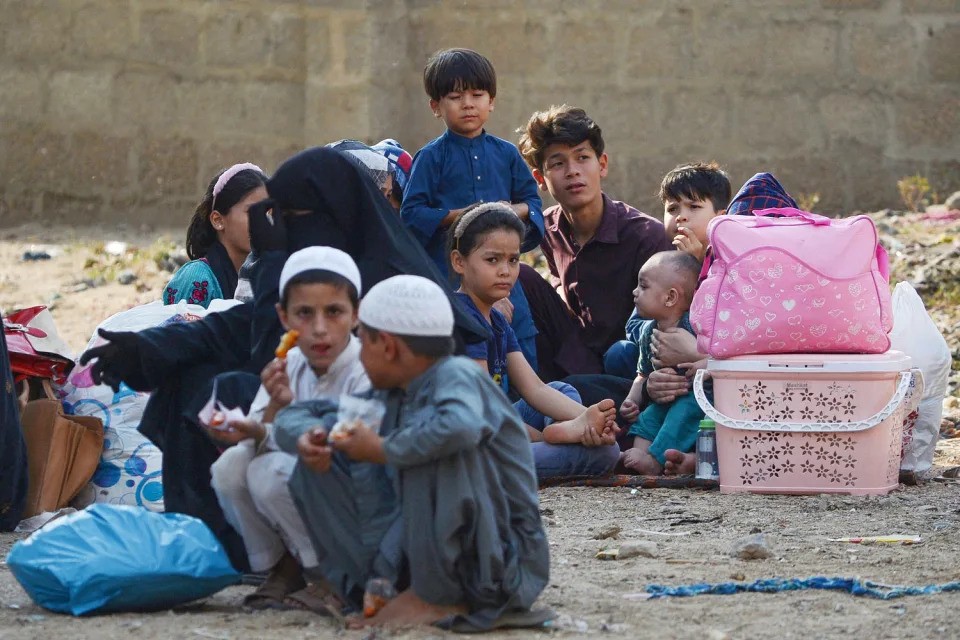
More than 10,000 Afghans living in Pakistan rushed to the borders on October 31, just hours before a deadline for 1.7 million people to leave Pakistan voluntarily or face arrest and deportation.
(Rizwan Tabassum / AFP via Getty Images)
Afghanistan, which has called Pakistan’s plan “unacceptable” and asked for the deadline to be extended, has set up a high commission to assist forcibly returned Afghan refugees with temporary accommodations and other services.
“We are here to welcome our Afghan brothers and sisters in their motherland,” Taliban spokesman Zabihullah Mujahid said. “We will utilize all our resources to facilitate them in their rehabilitation.”
Activists, journalists, artists and people who worked as officials or soldiers for Afghanistan’s former U.S.-backed government are at particular risk, U.N. officials say. So are women and girls, whose rights to education, work and free movement have been rapidly rolled back under the Taliban.
“For an overwhelming majority of them, living and studying in Pakistan may be their only chance of gaining a formal education,” Amnesty International said in a statement Tuesday, calling on the international community to help Pakistan with the cost of hosting Afghan refugees.
More than 100 former U.S. leaders, diplomats and others also objected to the planned deportations of Afghans, thousands of whom fled Taliban rule and have been waiting for more than two years in Pakistan for U.S. visas.
“This decision would only cause chaos and make a bad situation worse,” they wrote in an open letter. “We urge Pakistan to work with us to resettle qualifying individuals in the U.S., not send them back to Afghanistan where they face certain doom.”
There are more than 2 million undocumented Afghans living in Pakistan, according to the U.N., at least 600,000 of whom arrived after the Taliban regained power in August 2021 amid the withdrawal of U.S. and NATO forces. Others fled while Afghanistan was occupied by the then-Soviet Union from 1979 to 1989 or after the U.S. invaded Afghanistan following the Sept. 11, 2001, terrorist attacks.
The majority of those more recent arrivals are undocumented, according to Qaiser Khan Afridi, a spokesperson for the U.N. High Commissioner for Refugees. If they return to Afghanistan, he said, “there are serious potential threats to their freedom and safety.”
Many also face major financial losses, since the Pakistani government is limiting the amount of cash migrants can take out of the country.
Habib Jan, 24, who works as a cook at a restaurant, said he and his father were both born in Peshawar and had never been to Afghanistan.
“I married a Pakistani woman and had two children with her,” he said. According to Pakistani law, however, a foreign man who marries a citizen isn’t entitled to citizenship, though a woman from another country is eligible if she marries a Pakistani man.

Habib Jan, 24, is working as a cook in Peshawar’s famous restaurant, famous for its delicious rice cooked in meat. He said he and his father were born in Peshawar but had never been to Afghanistan. “I am the only child of my parents. I married a Pakistani woman and had two children from her. We don’t have a single piece of land in Afghanistan and the second major problem is my wife doesn’t want to go to Afghanistan,” he said.
Afghanistan, which has called Pakistan’s plan “unacceptable” and asked for the deadline to be extended, has set up a high commission to assist forcibly returned Afghan refugees with temporary accommodations and other services.
“We are here to welcome our Afghan brothers and sisters in their motherland,” Taliban spokesman Zabihullah Mujahid said. “We will utilize all our resources to facilitate them in their rehabilitation.”
Activists, journalists, artists and people who worked as officials or soldiers for Afghanistan’s former U.S.-backed government are at particular risk, U.N. officials say. So are women and girls, whose rights to education, work and free movement have been rapidly rolled back under the Taliban.
“For an overwhelming majority of them, living and studying in Pakistan may be their only chance of gaining a formal education,” Amnesty International said in a statement Tuesday, calling on the international community to help Pakistan with the cost of hosting Afghan refugees.
More than 100 former U.S. leaders, diplomats and others also objected to the planned deportations of Afghans, thousands of whom fled Taliban rule and have been waiting for more than two years in Pakistan for U.S. visas.
“This decision would only cause chaos and make a bad situation worse,” they wrote in an open letter. “We urge Pakistan to work with us to resettle qualifying individuals in the U.S., not send them back to Afghanistan where they face certain doom.”
There are more than 2 million undocumented Afghans living in Pakistan, according to the U.N., at least 600,000 of whom arrived after the Taliban regained power in August 2021 amid the withdrawal of U.S. and NATO forces. Others fled while Afghanistan was occupied by the then-Soviet Union from 1979 to 1989 or after the U.S. invaded Afghanistan following the Sept. 11, 2001, terrorist attacks.
The majority of those more recent arrivals are undocumented, according to Qaiser Khan Afridi, a spokesperson for the U.N. High Commissioner for Refugees. If they return to Afghanistan, he said, “there are serious potential threats to their freedom and safety.”
Many also face major financial losses, since the Pakistani government is limiting the amount of cash migrants can take out of the country.
Habib Jan, 24, who works as a cook at a restaurant, said he and his father were both born in Peshawar and had never been to Afghanistan.
“I married a Pakistani woman and had two children with her,” he said. According to Pakistani law, however, a foreign man who marries a citizen isn’t entitled to citizenship, though a woman from another country is eligible if she marries a Pakistani man.

Habib Jan, 24, is working as a cook in Peshawar’s famous restaurant, famous for its delicious rice cooked in meat. He said he and his father were born in Peshawar but had never been to Afghanistan. “I am the only child of my parents. I married a Pakistani woman and had two children from her. We don’t have a single piece of land in Afghanistan and the second major problem is my wife doesn’t want to go to Afghanistan,” he said.
(Mushtaq Yusufzai / NBC News)More
“We don’t have a single piece of land in Afghanistan, and the second major problem is my wife doesn’t want to go to Afghanistan,” Jan said.
Musafar Khan, who has a business selling fruits and vegetables with his brothers, said neither he nor any of his 11 siblings, all born in Peshawar, have ever been to their family's native village in Afghanistan’s eastern Nangarhar province. His family has proper documentation and does not plan to leave Pakistan, he said, but they worry they might be forced to, nonetheless.
“Pakistan is a remarkable country and the people are extremely welcoming and friendly,” Khan, 35, said. “We don’t even have a house in Afghanistan, so where would we be living if sent back?”
He added that his family has always considered Pakistan their home. Even so, he said, they decided to sell their house in case they get deported and need money.
“We have all the relevant documents to stay here, but we sold our house in Peshawar at a throwaway price as anything can happen to us,” Khan said.
Undocumented migrants in Pakistan are being deported as Afghanistan faces widespread hunger that is likely to get worse as winter approaches. The country is also still dealing with the aftermath of a series of earthquakes in October in the province of Herat, in which women and children made up more than 90% of deaths.
Tensions between Pakistan and Afghanistan, which share a border of about 1,600 miles, have increased in the past two years over a surge in attacks on Pakistani security forces by the Tehreek-e-Taliban Pakistan (TTP), or Pakistani Taliban. Pakistan accuses Afghanistan of harboring Islamist militants from the group, which is separate from the Afghan Taliban but has a similar ideology.
Days before Pakistan announced the deportations, suicide bombings at two mosques in provinces bordering Afghanistan killed about 60 people. The TTP denied it was responsible.
This article was originally published on NBCNews.com
“We don’t have a single piece of land in Afghanistan, and the second major problem is my wife doesn’t want to go to Afghanistan,” Jan said.
Musafar Khan, who has a business selling fruits and vegetables with his brothers, said neither he nor any of his 11 siblings, all born in Peshawar, have ever been to their family's native village in Afghanistan’s eastern Nangarhar province. His family has proper documentation and does not plan to leave Pakistan, he said, but they worry they might be forced to, nonetheless.
“Pakistan is a remarkable country and the people are extremely welcoming and friendly,” Khan, 35, said. “We don’t even have a house in Afghanistan, so where would we be living if sent back?”
He added that his family has always considered Pakistan their home. Even so, he said, they decided to sell their house in case they get deported and need money.
“We have all the relevant documents to stay here, but we sold our house in Peshawar at a throwaway price as anything can happen to us,” Khan said.
Undocumented migrants in Pakistan are being deported as Afghanistan faces widespread hunger that is likely to get worse as winter approaches. The country is also still dealing with the aftermath of a series of earthquakes in October in the province of Herat, in which women and children made up more than 90% of deaths.
Tensions between Pakistan and Afghanistan, which share a border of about 1,600 miles, have increased in the past two years over a surge in attacks on Pakistani security forces by the Tehreek-e-Taliban Pakistan (TTP), or Pakistani Taliban. Pakistan accuses Afghanistan of harboring Islamist militants from the group, which is separate from the Afghan Taliban but has a similar ideology.
Days before Pakistan announced the deportations, suicide bombings at two mosques in provinces bordering Afghanistan killed about 60 people. The TTP denied it was responsible.
This article was originally published on NBCNews.com
No comments:
Post a Comment